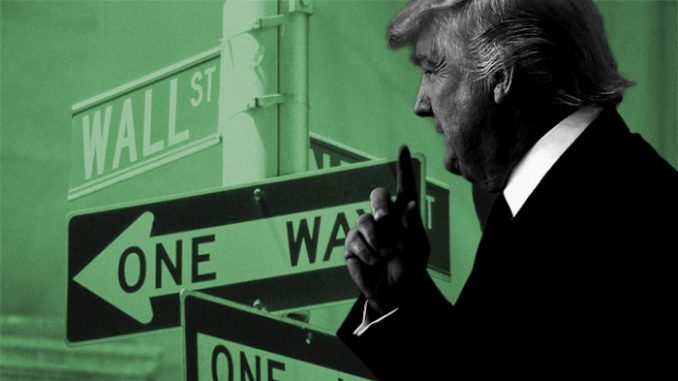The push in Michigan extends beyond Antrim County. The board of commissioners of Cheboygan County, Mich., voted 4-3 last week to request an audit of the county’s results, asking the state elections director to approve it. Trump won the country overwhelmingly.
“There is no information or gain that can be made from this audit. Things will stand as they are,” Cheboygan Commissioner Michael Newman, a Republican and one of the three commissioners who voted against requesting an audit, said in an interview.
The commissioners who voted for an audit did not respond to interview requests.
Newman, who said he believes Biden was duly elected, said there was a local pressure campaign to push for an audit, but that constituents in his district urged him to vote against it.
“They want to see us all changed so we’re not seated anymore, and they want to go after our county administrator,” Newman said of activists pushing for the audit.
And in the state legislature, freshman Republican state Rep. Steve Carra recently filed legislation calling for a “forensic audit” of the results. Carra, who said he believed there was substantial fraud during the 2020 election, is primarying Rep. Fred Upton (R-Mich.), one of the Republicans who voted to impeach Trump. He said the election results are an animating factor among Republicans.
“I think it is the number one issue from people in my community. And I also think it’s the number one issue for all of my conservative colleagues around the state,” Carra said. “So if they vote against this, I think that’s something that people from their communities would not appreciate.”
Similar pushes have materialized elsewhere. Pennsylvania state Sen. Doug Mastriano has boosted his political profile by becoming one of the vocal proponents of Trump’s lies about the election, and is considering a run for governor in the state. Mastriano, who visited the Arizona site, has pushed for an audit in his home state — and Trump has attacked Republican leaders in Pennsylvania who have not backed him, even name checking Republican state Senate leader Jake Corman.
“Other State Senators want this Forensic Audit to take place — immediately,” Trump said in a mid-June statement. “I feel certain that if Corman continues along this path of resistance, with its lack of transparency, he will be primaried and lose by big numbers.”
In Georgia, conspiracy theories about Trump’s loss persist, despite the fact the state saw its votes recounted twice in 2020. Republican State Party Chair David Shafer, who also toured the Arizona site, has praised the calls for an audit in his home state.
“The vast majority of Republicans believe that there were irregularities in the last election that have not been fully investigated,” Shafer said on the sidelines of the state party convention earlier this month.
A Georgia state judge also recently dismissed most of a lawsuit that sought to review absentee ballots in Fulton County, home to Atlanta. The suit was by plaintiffs who were trying to find fraud in the state.
And in Wisconsin, state Assembly Speaker Robin Vos has hired retired police officers to investigate “potential irregularities and/or illegalities” in the election. Two Assembly Republicans who traveled to Arizona have also said they’d like to see a similar undertaking in their state, and Trump has recently attacked Vos and other Republicans in the state for “actively trying to prevent a Forensic Audit,” although backlash to Vos at the state convention was muted.
A Trump adviser recently told POLITICO that the former president remains “adamant about doing audits” and “is going to keep up pressure on Republicans to have the courage to do it.”
The particularities of the process in Arizona have also concerned election experts, who fear that activists elsewhere will try to mirror or copy a flawed approach from the state.
The so-called audit has crossed deep into conspiratorial territory. Workers had checked for bamboo fibers in ballots (a nod to a baseless theory that ballots may have been sent from Asia) and used UV lights on ballots, potentially for (non-existent) watermarks. Cyber Ninjas itself is owned by a man who has promoted the #StopTheSteal conspiracy theory, which is based in the belief that Trump actually won, and recently appeared in a conspiracy-filled film about the election.
“It was clear they had no idea how elections are administered,” Morrell, who served as an observer, said. “That’s the concern, is that we’ve suddenly left this place where we follow the rule of law, and it’s like the Wild Wild West.”
The effort, or at least its first stages, appears to be winding down. The pseudo-official Twitter account tweeted that the “paper examination and counting” of the nearly 2.1 million ballots concluded on Friday. But Ken Bennett, a former Arizona Republican secretary of state who has served as a liaison for the effort, told the Associated Press that a report is still weeks to months away.
(A request for an interview sent to Bennett and a second email address associated with the effort was acknowledged repeatedly by a staffer, but nobody was made available.)
Elections experts are already warning that any conclusion drawn from the Arizona review will be untrustworthy. A report from the nonpartisan States United Democracy Center, co-authored by former Kentucky Republican Secretary of State Trey Grayson and Barry Burden, the director of the Elections Research Center at the University of Wisconsin–Madison, ripped into the Arizona effort as being poorly run and not transparent.
Grayson also said fixation on 2020 will hurt Republicans in the long run. “I want to be involved in this [report] because I’m worried,” he said, noting he is an active party member and just recently attended a fundraiser for a Republican senator. “I want Republicans to see, ‘Here’s one of us who’s telling you don’t waste your time, don’t waste your money. You’re undermining confidence. It’s backfiring.’”
Trump and his supporters have also glommed on to legitimate efforts elsewhere, quickly abandoning them when they did not turn up evidence of fraud the former president wanted.
A bipartisan group of New Hampshire lawmakers authorized an audit of a state House of Representatives race after a recount showed a Republican candidate actually received hundreds more votes than initially tallied. The New Hampshire audit was extremely unusual, election experts say, because it took place well after the election, and there were no established laws for how to conduct a post-election audit in the state. The major difference between Arizona and New Hampshire? This audit was run by well-respected election professionals.
Trump initially praised the audit as part of the “incredible fight to seek out the truth on the massive Election Fraud which took place in New Hampshire and the 2020 Presidential Election.”
But the actual culprit was not a conspiracy of fraud, but instead a likely combination of tabulators that incorrectly read poorly-made folds in ballots, voters casting too many votes in certain races, and dusty machinery. Trump did not issue a public proclamation when a more innocuous explanation was laid out.
“That’s kind of why I did this crazy thing, because I felt someone had to,” said Mark Lindeman, who helped run the New Hampshire audit and is the acting co-director of Verified Voting, citing threats to election workers that have stemmed from conspiracy theorists.
“I thought either someone, if I may say this about myself, responsible would do the work,” he continued. “Or deeply irresponsible people — and, in fact, the same people who have done the work in Maricopa County — would have done it.”
Maya King, David Siders and Meridith McGraw contributed to this report.
Related posts:
Views: 0
 RSS Feed
RSS Feed

















 June 30th, 2021
June 30th, 2021  Awake Goy
Awake Goy 





 Posted in
Posted in  Tags:
Tags: 
















